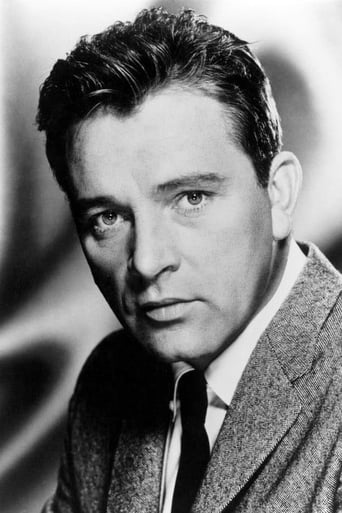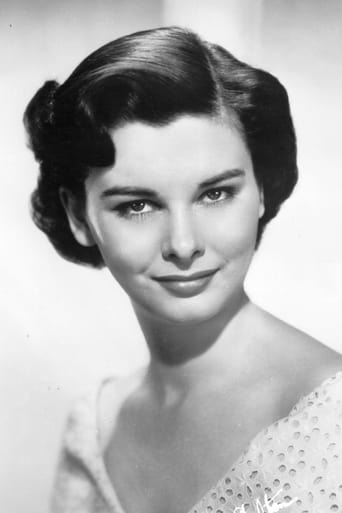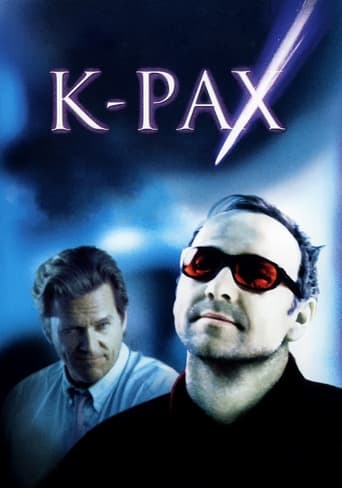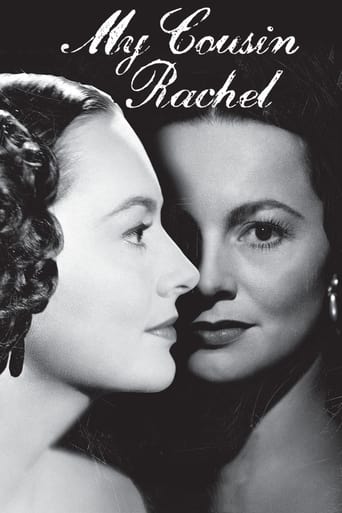
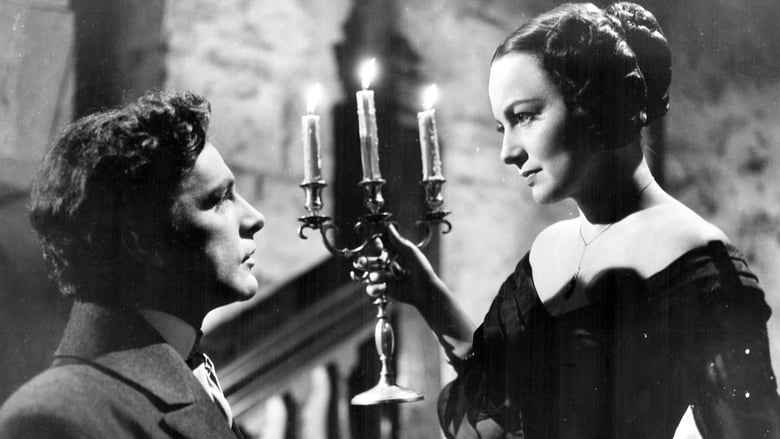
My Cousin Rachel (1952)
A young man plots revenge against the woman he believes murdered his cousin, but his plans are shaken when he comes face to face with the enigmatic beauty.
Watch Trailer
Cast
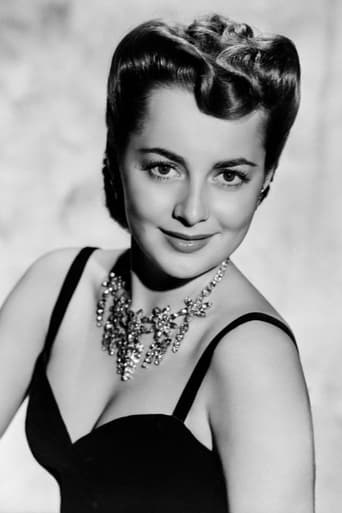
Similar titles
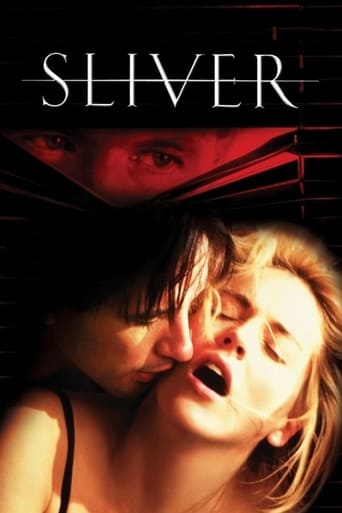
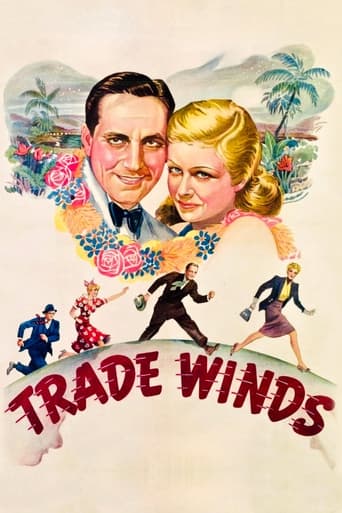

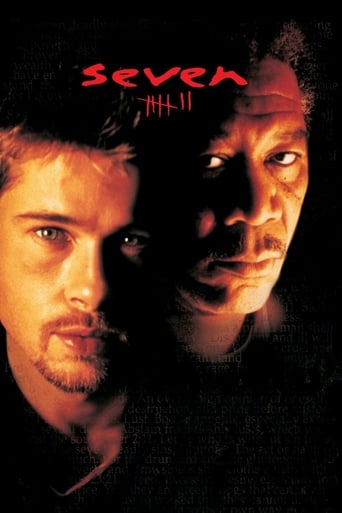
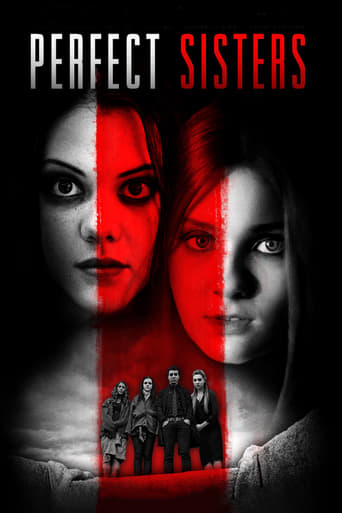
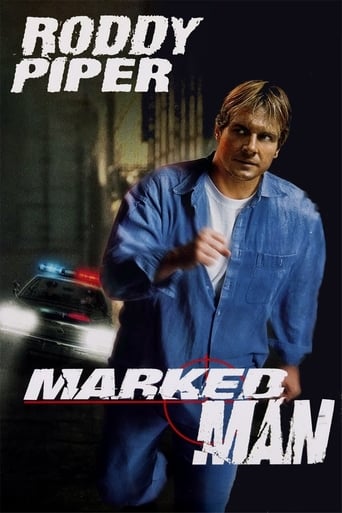
Reviews
If you don't like this, we can't be friends.
Pretty good movie overall. First half was nothing special but it got better as it went along.
It’s not bad or unwatchable but despite the amplitude of the spectacle, the end result is underwhelming.
Very good movie overall, highly recommended. Most of the negative reviews don't have any merit and are all pollitically based. Give this movie a chance at least, and it might give you a different perspective.
Philip Ashley (Richard Burton) is a brash young man in this Gothic tale. When Cousin Ambrose writes to him that his wife is slowly killing him, he accepts it without question...even though it's very possible Ambrose was not in his right mind. After all, his father died of a brain tumor...perhaps this is causing Ambrose to compose these weird letters. Regardless, Philip is pre-disposed to hate Ambrose's wife, Rachel (Olivia de Havilland). Philip rushes to Italy to see his cousin but the man was dead and buried by the time he arrived. His widow was not there and Philip immediately leaves to return to his estate.Out of the blue, Rachel arrives at Philip's estate soon after this. Inexplicably, he almost immediately likes her and just assumes the letters were the ramblings of a madman. While this could be true, Philip's change of heart betray him as a very immature sort of young man. And, when he falls for Rachel and wishes to marry her, you wonder....is this a marriage made in Heaven or a prelude to his soon descent into Hell? Regardless, it soon becomes apparent that Philip has some serious issues!When Ben Mankiewiecz introduced this film, he indicated that many thought Richard Burton was miscast as Philip because he was too old...though he was only 26. He just happened to look older and the part called for a young many about to turn 25. Burton's performance earned him an Oscar nomination--oddly, for Best Supporting Actor even though he was in every scene and clearly was the star. His performance is full of power and intensity...perhaps too much at times for my taste. This movie is in many ways very reminiscent of the earlier film "Suspicion" which, interestingly, starred de Havilland's sister (Joan Fontaine). It keeps you guessing as to Rachel and her innocence...as well as Philip's sanity. Well made and interesting.
A vintage film adaption of Daphne du Maurier's novel by director Henry Koster, as a much anticipated follow up for it star Olivia de Havilland after her second Oscar win in THE HEIRESS (1949). However, MY COUSIN RACHEL now is mostly remembered as a stepping stone introducing British thespian Richard Burton to the Hollywood. At the age of 27, he upstages an almost one- decade senior Olivia de Havilland in this mysterious romance.Philip Ashley (Burton), is an orphan raised by his elder cousin Ambrose (Sutton) living in Cornwall, he is devastated by the sudden death of Ambrose from brain tumour in Florence, who has just married to a widow Rachel (de Havilland) whom Ambrose meets there during the winter season. Which makes thing worse is Philip receives two letters from an ailing Ambrose before his ultimate death, implicates Rachel for his illness. So apparently it could be Rachel's sinisterly hatched plan to inherit Ambrose' well-heeled property. However, in his will, Ambrose leaves the estate to Philip, thus, one hanging question remains, will Philip becomes Rachel's next prey?Both the source novel and the film play well the trumping card, aka, the true colour of Rachel, is she a cold-hearted schemer or just an unfortunate woman shrouded by tragedies, or perhaps she lurks in between. Casting Ms. de Havilland, who is so distinguished in her meek, genial persona, as Rachel, is to maximally establish the contrasting nature of the character, her demure, understanding front is poles apart from what Philip conceives, he hopelessly falls for her almost instantly, his indignation melt away completely to a degree he even grants her the entire estate and family jewellery. She takes them all but inexplicably refuses his marriage proposal. Then Philip falls sick, all the ominous trappings - poisonous seeds, a second will, Rachel's secret connection with her Italian lawyer Guido Rainaldi (Dolenz) - start to push the story into a conventional climax, a young man's doomed infatuation with an elder femme fatale, only this time, a blunt twist quickly alters the finale, leaves a pungent gusto of ambivalence in the mouth.Burton harvests his very first Oscar nomination here, but nonsensically as a supporting actor, sometimes these flagrant category frauds keep reminding us we shouldn't take Oscar too seriously (mostly for the nomination process), it is a game of campaign and inside-dealing, whoever has watched this film, knows that Burton has the most screen-time and the story entirely revolves around his character, such an ignoble stigma is just too glaring to ignore, sadly, the fashion of delegating leading performance to the supporting group is still rampant now, just name a few, Jamie Foxx in COLLATERAL (2004, 7/10), Hailee Steingeld in TRUE GRIT (2010) and Helen Hunt in THE SESSIONS (2012). Nevertheless, Burton is radiant with passion and eloquent line-delivery, despite the romantic chemistry hasn't been convincingly justified, it is hard for audience to concur with Philip's obsession with Rachel, while there is an attractive and sensible ingénue Louise Kendall (Dalton) around, whom he can merely treat as a young sister. After all, there is little to be found naturalistic in this much contrived drama about the mystic side of human psyche.
The ending. That's what is commented on most and with good reason. Because the resolution is purposely ambiguous, it disappoints or frustrates many.I think the ending, which does not stamp the seal of innocence or guilt upon Rachel, is appropriate to the story. The plot carefully builds two sides to Rachel's character. She is either the sweetest warmest person ever, or a fortune seeker where marriage and murderer are not out of the question. The story builds a strong case for both perspectives. This is the larger point of the story - it's about perceptions, communication and judgments humans make, that we sometimes have to make without the ability to determine the truth and the inherent danger in doing so. This is how life sometimes is - nowadays we call them gray areas. My Cousin Rachel it's not necessarily a mystery story that needs to be resolved, but more truly a comment on the folly of human interactions, especially where money and greed are involved.Yet even if you demand a solid resolution, the ending should not be seen as a let-down. If you believe the story shows her guilt more prominently, then in the end you can argue that fate stepped in, (seconds too late) and justice was done - she paid with her life for murder, as the opening death scene foretold. On the other hand If you believe her innocent, then her murder can be explained in her extremely poor manner of showing and communicating her intentions, leaving highly bad impressions to those it mattered most.I think my reading of the outcome is backed up by the fact then when the author of the novel was asked about the innocence of Rachael, she herself did not know. Solving the mystery was not the author's intention. Brent Chastain top3films.com
I had to laugh at the conclusion of this mystery drama! I couldn't keep a straight face at the kind of cop-out conclusion du Maurier slapped on this novel's end. Throughout the ENTIRE story she throws bundles of evidence at us, both that de Havilland (Rachel) IS guilty and that she ISN'T guilty. The reader/viewer is manipulated and lead on like an obedient little dog to sniff out every little clue which du "Agatha Christie" Maurier points to, and like a good little doggy we, the viewers, follow the clues, thinking - as it turns out - very naively that the clues will lead us to a bone, i.e. to a reasonable, logical conclusion to the complex mystery of Rachel's past, her intentions, and whether she killed Burton's relative or not.But what happens at the end? Burton, being convinced of her guilt, arranges an "accident" which kills her, but moments before she dies he suddenly gets (yet another) clue - one that seems to suggest her innocence. The last scene is Burton looking at the sea-shore, telling himself how he will never find out whether she was guilty or not. What a cop-out. Sure, one can argue that it's the kind of mysterious ending that is suitable to a story full of mystery and heavy contradictions, and I have nothing against endings that are ambiguous. However, the major problem with this is that du Maurier gives us very strong arguments to support Rachel's innocence, as well as bombarding us with enough evidence and clues that point to her guilt to make a black L.A. jury convict ten O.J. Simpsons. In other words, Rachel can be neither innocent nor guilty - as absurd as that sounds; whichever conclusion one prefers - there is too much info pointing in the other direction. And that is exactly why the ending is without an answer; my belief is that the writer herself didn't so much strive for a mysterious, romantic, ambiguous ending so much as strive for a way to conclude the book which enables her to escape the trappings of her own illogicalities and inconsistencies. She had realized what a mess she had written - as far as common sense and logic were concerned - and knew that a clear-cut ending wouldn't make any sense. She cons the viewer into attentively following the story, as the latter waits for a reasonable explanation. In that way she succeeds; after all, the story keeps your attention, and the interest actually grows.The evidence pointing to de Havilland's innocence is not as abundant as that pointing towards her guilt, but it can be considered sufficient: 1) she does not sue for her late husband's assets (though this can be explained away as a refined tactic of hers - but I think it's too far-fetched to explain it away like that), 2) de Havilland shows genuine care for Burton's mental instability - during his illness - when she makes a rather worried and sad facial expression at a time when no one was watching her (so there was no point in faking it), 3) the letter which Burton finds at the end.The case for her guilt is more voluminous, though: 1) she looks extremely worried about Burton having received her late husband's secret letters: worried in a rather guilty-looking way, 2) the highly suspicious poisonous(?) seed which grew both in the garden at Burton's villa, and Rachel's home in Italy, and which Burton even finds in a hidden(?) envelope (this last scene makes her look extremely suspicious - it isn't common to send seeds through mail), 3) the way she suddenly changes her tone toward Burton once she inherits everything - and this sudden change CANNOT be explained away by the fact that she was perhaps annoyed by his sudden and public marriage proposal (which may or may not have taken place the night before - even this du Maurier can't or won't tell us), 4) the way she offers Burton a cup of her own tea, but won't drink it herself - and throws it in the grass - after he asks her to drink it herself, 5) she then comes to him with another highly suspicious liquid concoction, and even tells him that he must drink it when she leaves (though this can perhaps be explained away by her worry about his condition - but that's a rather shaky argument), 6) her suspicious past - rumours or not, she seems to have at least some skeletons - which includes: a) the one about her having lost her first husband in a duel between him and her lover, b) having large debts, and living beyond her means, c) any two-time widow in her mid-30s is suspicious unless your name is Anna Nicole Smith, d) her immediate over-drawing of money from her bank-account, the moment she received Burton's first generous payment, e) her sending of big amounts of money to Italy.A lot of the clues which point in one way or another depended less on the story than on de Havilland's acting; the facial expressions she makes in some key situations alternately show both guilt and innocence. The fact that she reacts in ways that both make her look extremely suspicious and innocent, alternately, is not her fault: de Havilland, like the author herself, didn't herself know whether she was playing a killer or not, so she had little choice in trying to act logically. Burton plays a rather naive guy in his 20s, who actually signs off all his possessions to Rachel - against the advice of his lawyer - and even tears apart Rachel's late husband's letters which are rather incriminating. He plays a guy so dumb that I figured that if she is ripping him off then he probably deserves it.The film ends with a giant scam - the cop-out - but it is nevertheless very involving, increasingly interesting, and fairly atmospheric.
